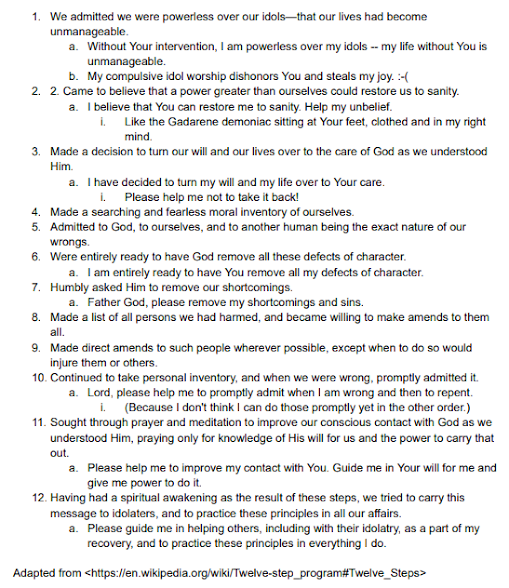Idolatry does not only mean worshipping statues that represent a deity or force. Tim Keller wrote a good book on idolatry called Counterfeit Gods and he defines it as 'a good thing turned into a pseudo-salvation'. (Here's a good personal example from Tim of Christian ministry as an idol in his life.) Some potential idols include self-esteem, pride, approval, money, power, security, work, food, feeling good, happiness, fitness and sex.
Something else that Tim Keller talk about is that people are made to worship. Not worshipping is not an option. We will worship something. What will it be?
(Almost 29 years ago I preached a youth sermon titled Natural-born Idolaters that pointed in this direction.)
Dallas Willard talks about the efficacy of Alcoholics Anonymous and how it produces change in people. I think he says that churches should be more like AA.
In that vein, I have been thinking for a while: what is my most fundamental problem that I need to address and how should it be framed? Sin? Idolatry? Neuroticism? (Not that the most fundamental problem needs to be addressed. Making a dent in any one of these would be a good start.) I had considered the idea of 'Idolaters Anonymous' before.
What prompted me to finally take a next step was some of the things I came across in The Epistle to the Galatians (commentary) by FF Bruce:
Gal 4.3 -- We were enslaved under the elemental forces of the world.
- The law is one.
Gal 4.9 -- How can you turn back to the weak and beggarly elemental forces, to which you desire to be enslaved all over again?
- The Galatians were reverting to a form of religion which they had practiced before their conversion.
- 'The demonic forces of legalism, then both Jewish and Gentile, can be called 'principalities and powers' or 'elemental spirits of the world'.' Bruce, Galatians, p203
- 'Against those who enjoy 'the liberty of the glory of the children of God' the stoikheia [powers] are powerless.
- 'They cannot reassert their authority over them unless they put themselves back under their power… This suggests that the stoikheia are demonic forces which hold in thrall the minds of men and women who follow their dictates, but lose their potency as soon as their minds are emancipated.' p204
- 'The stoikheia tou kosmou cover all the things in which man places his trust apart from the living God; they become his gods, and he becomes their slave.'
Gal 5.1 -- 'With freedom, Christ has set us free; stand firm, therefore, and do not be encumbered with a yoke of slavery.' p214
Gal 5.21 -- 'For Paul, as R. Jewett wisely points out, flesh 'is not rooted in sensuality but rather in religious rebellion in the form of self-righteousness which was in his terms a 'boasting in one's own flesh'.'' p250
So I personalized the language of AA to idolatry and my general experience. You can see it in the image below (or click through to the Google Doc).
What do you think? Does any of this ring a bell with you? Let me know if you want to discuss it.


No comments:
Post a Comment